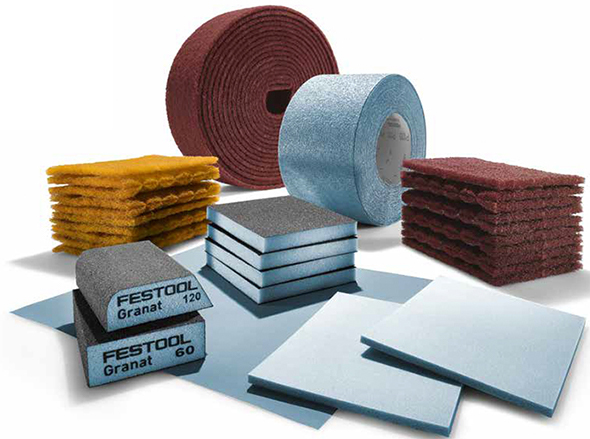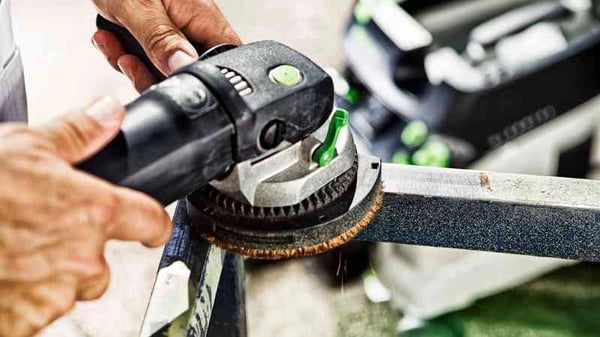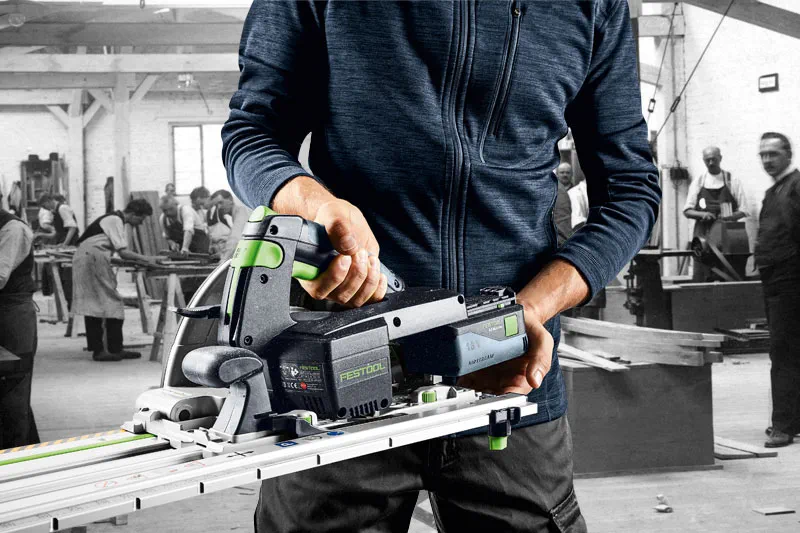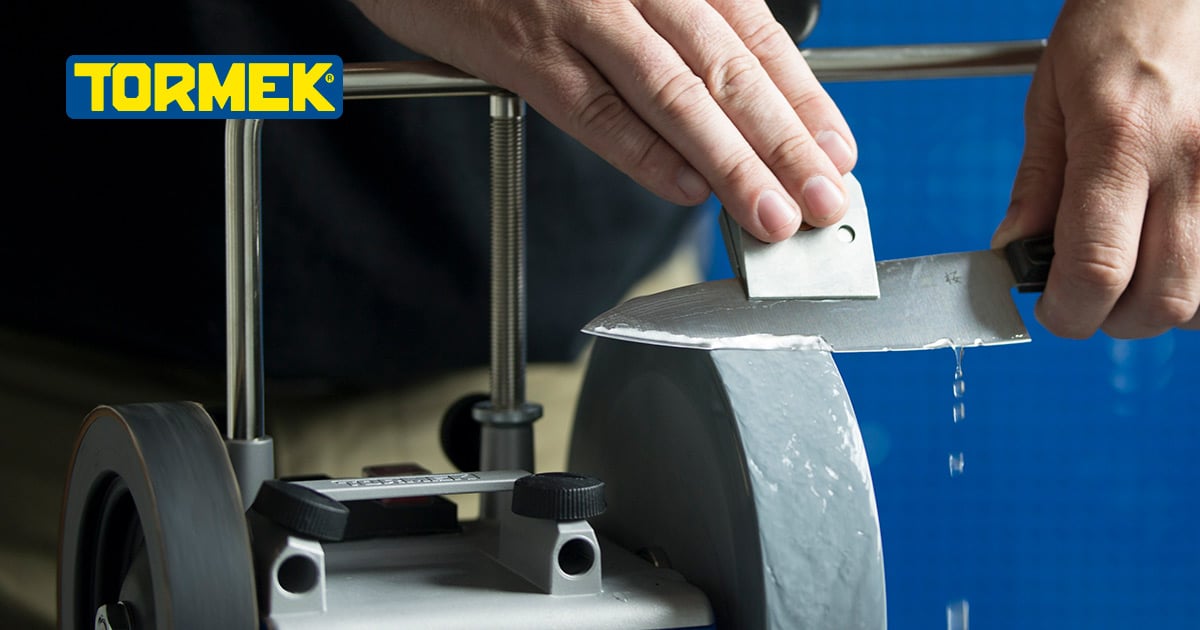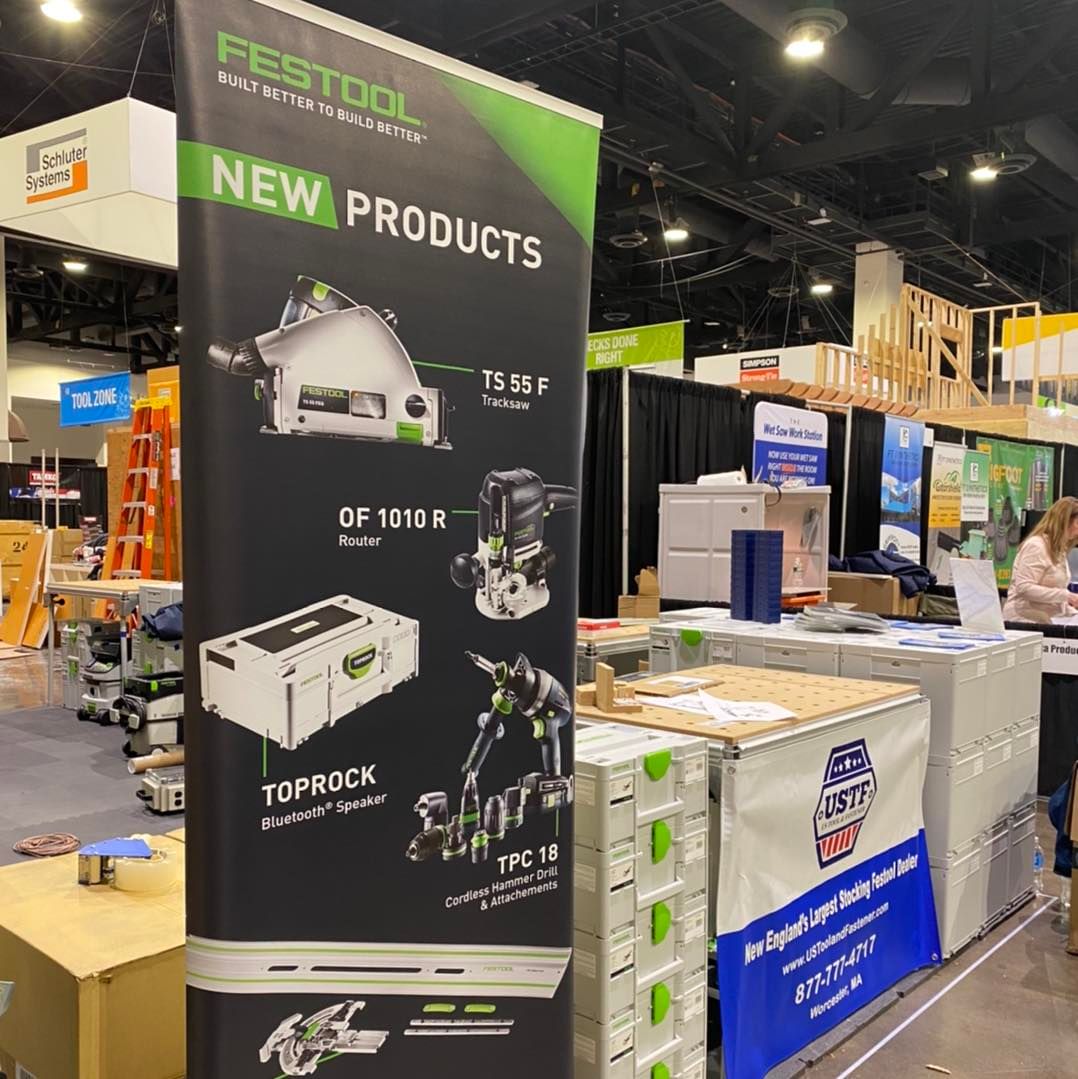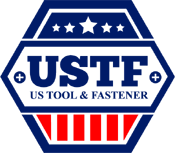A great finished product starts with selecting the right tools for the job.
With dozens of abrasives on the market and a countless number of applications that they can be used for, it can be difficult to determine exactly which abrasives are right for the needs of the job at hand.The following guide will provide insights into each of the different types of abrasives offered by Festool for use with their high-quality sanders. And remember, when in doubt, simply contact our experts and we’ll help you find exactly what you need to complete your project.
Table of Contents:
Introduction: A Brief History of Abrasives
Conclusion: So, Which Should I Use?
Introduction: A Brief History of Abrasives
Abrasives have been around for nearly as long as mankind. Centuries ago, our ancestors would use stones, branches, and other hard surfaces to shape weapons and tools. Sandpaper, meanwhile, originated in the 13th century when Chinese innovators adhered crushed shells to parchment paper and used their newfound device to smooth surfaces.
Crushed shells are not the only natural abrasive that has been used over the years. Garnet is a gemstone that can be crushed into sharp-edged granules that lend themselves nicely to grinding and smoothing surfaces. Sandpaper made with garnet is typically identifiable by its red coloring and is still commonly used as an abrasive today.
Another naturally occurring abrasive is emery, which you may recognize from the common emery boards used to file nails. Emery has a slightly higher hardness than garnet, though its industrial use has mostly been negated by the invention and implementation of synthetic alternatives. Its modern use as an abrasive is typically limited to glass shaping and polishing, but it’s more often used in the production of non-skid materials rather than as an abrasive.
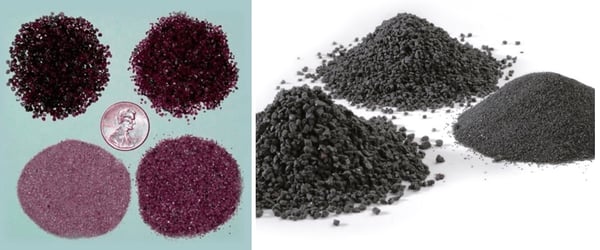
Left: Garnet, Right: Emery
Synthetic abrasives, in contrast, were first introduced in the late 1800s, and the first major innovation in abrasives during this time was silicon carbide (SiC). SiC is technically a naturally-occurring mineral, but it’s such a rare mineral that it must be mass produced in order to be used in industrial applications. The second abrasive developed in this era was aluminum oxide, more commonly referred to simply as alumina. Alumina is synthetically-made for a wide variety of applications beyond abrasives, including spark plug insulators and even dental implants!
The 1950s saw the creation of the first synthetic diamonds, which are developed by pressurizing graphite. This process makes it difficult (and very expensive) to achieve gem-worthy synthetic diamonds, however, so they’re hardly ever used as jewels and are primarily produced for industrial applications such as abrasives.
![]() Left: Silicon Carbide, Right: Synthetic Diamonds
Left: Silicon Carbide, Right: Synthetic Diamonds
Woodworking
Woodworking is a craft that requires precision and careful attention to detail. Whether you’re a hobbyist building furniture or a professional carpenter hired for a project, it’s imperative that you use high-quality tools and accessories in order to achieve professional-looking results. Here are some of the best abrasives that you can and should use in your woodworking efforts.
Granat (40-1,500 Grit) Ultra versatile, longest lasting abrasive
Festool Granat abrasives are widely praised for their longevity, high performance, and versatility. They have a well-established reputation for outperforming other sandpapers with supreme quality finishes, and last twice to three times as long as regular abrasives. In fact, The Australian Wood Review raved about Festool’s Granat abrasives, stating:
“Granat has earned its title of Festool's premium abrasive due to its ability to tackle any standard sanding procedure, from coarse and fine sanding through to finishing and spot repairs. Granat was designed with a high material removal capacity, a long service life and flawless surface quality in mind.”
Granat is durable enough to effectively work on hardwoods such as cherry, mahogany, and oak, yet also gentle enough to be used on soft woods such as cedar and pine. Lower grits, in the 40 to 80 range, are great for smoothing uneven wood and removing paint, while the 400+ grits allow you to get a mirror finish on your projects.
What makes Granat special is the way that it is produced with a full mixed compound which is added to the backing in a way that fully covers the paper with abrasive granules. The granules are tightly adhered to the backing, preventing cracking, tearing, and chunks falling off even during rigorous, prolonged use. With the abrasive particles holding strong to the paper, their sharp tips are able to remove the material from the surface which you are sanding.
Granat sandpaper is available in sheets, rolls, and even sponges for hand-sanding those hard to reach nooks and crannies, which experienced woodworkers know can be the difference between a good project and an exceptional project.
Granat Net (80-400 Grit) For applications that produce high volumes of dust
Building off of the ingenuity and success of the original Granat, Festool developed Granat Net. This abrasive offers the same level of longevity and reliability as its predecessor, but with some additional flexibility and even better dust control.
Leo Zirkler, Festool’s vice president of marketing, praised this abrasive, stating:
“Our new Granat Net abrasive is the perfect solution for surface sanding operations that produce high volumes of dust.”
Granat Net provides a sanding experience that is as close to completely dust-free as possible. Its uniquely netted design reduces clogging and tearing while also allowing dust to be easily and quickly removed—all during the process of sanding. With Granat Net, no extra clean up is required.
Woodworkers and drywall contractors particularly appreciate the predictable, consistent finish that can be achieved with Granat Net. In a field where details reign supreme, Granat Net will make sure your woodworking projects or drywall construction come out flawless every time.
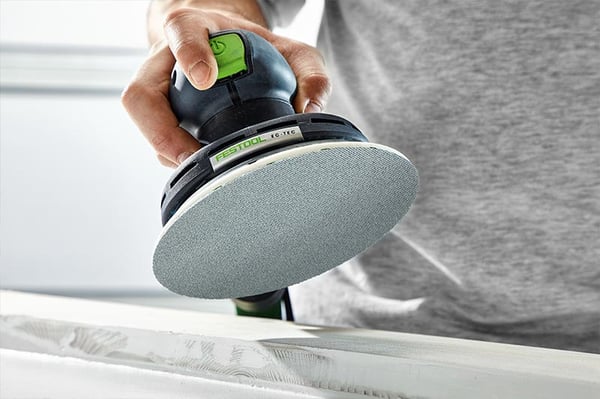
Platin 2 (400-4000 Grit) For use on semi-gloss and high-gloss finishes
When a project calls for a super fine finish, woodworkers know there’s no better option than Platin 2. This abrasive is foam-backed, which helps relieve the amount of pressure being applied to a project’s surface.
Platin 2 is also versatile and gentle enough to produce a soft, smooth, scratch-free finish and is widely used in woodworking to prepare surfaces for polishing.
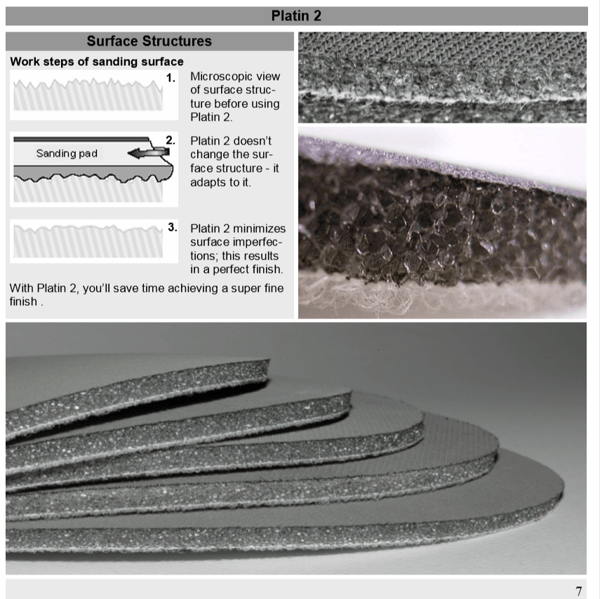
Rubin 2 (40-220 Grit) For sanding bare wood
Woodworkers are all too familiar with abrasive sheets that last all of a few minutes before they’re rendered unusable by either debris build-up or tears. Rubin 2 was created to solve both of those problems, and can effectively shred wood fibers while also preventing build up or clogging on the sheet’s surface. That means that it will work better for longer, eliminate wasted time changing out sheets, and save you from needing to waste money on additional supplies.
All in all, Rubin 2 abrasives boast a 30% faster removal rate and allow you to sand down through multiple levels without breaking a sweat. The following review of Rubin 2 was posted to the Festool Owners’ Group website:
“Rubin gives the best finish on bare wood because it is close coated (the grit particles are spaced close together). It is very noticeable, not just some B.S. to get you to buy more sandpaper. Much smoother surface with smaller scratches, therefore, it cuts slower. For smoothing of show surfaces in preparation for finishing, you are wasting your time to use anything else.”
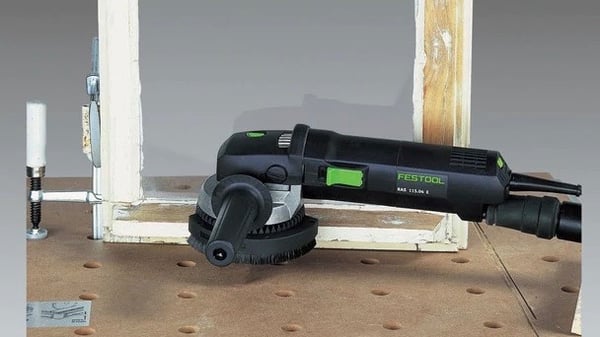
Woodworking Grits
Grit refers to the number of granules per inch of paper. Lower grit numbers refer to coarser sandpapers, while higher grit numbers are used for finer surfaces and finishes. As a general rule, most woods can be initially sanded with 120 to 150 grit, and successively sanded up to a 220 grit finish.
-
Heavy Duty Sanding
-
Granat: 40 to 60 Grit
-
Rubin 2: 24 to 60 Grit
-
Saphir: 24 to 50 Grit
-
Coarse Sanding
-
Granat: 80 to 120 Grit
-
Granat Net: 80 to 120 Grit
-
Saphir: 80 to 120 Grit
-
Vlies: 80 to 100 Grit
-
Intermediate Sanding
-
Granat: 150 to 180 Grit
-
Granat Net: 150 to 180 Grit
-
Rubin 2: 80 to 120 Grit
-
Rubin 2: 150 to 180 Grit
-
Fine Finish
-
Granat: 220 to 1000 Grit
-
Granat Net: 220 to 400 Grit
-
Platin 2: 400 to 1000 Grit
-
Vlies: 280 to 320 Grit
-
Super Fine Finish
-
Granat: 1200 to 1500 Grit
-
Platin 2: 2000 to 4000 Grit
-
Vlies: 800 Grit
Painting
Professional painters face a different set of challenges when it comes to sanding and polishing surfaces. The materials they work with vary beyond different types of wood and include surfaces such as drywall and plaster. Painters may also be tasked with removing previous coats of paint or wallpaper, and as such, are ultimately concerned with carefully preparing the surface for a fresh, smooth paint job.
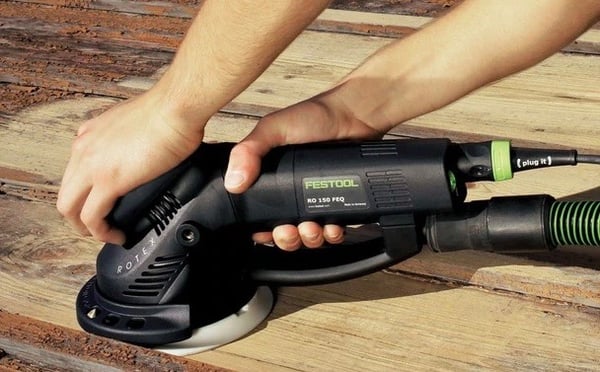
Granat (40-1,500 Grit) Ultra versatile, longest lasting abrasive
The Australian Wood Review endorsed Granat as a top option for professional painters, writing:
“Granat can be used on any kind of paint, filler or clear-coat varnish. It is particularly suited to the tough undercoats used in advanced painting and coating systems.”
Granat is designed to keep the abrasives strongly adhered to the paper, meaning that they won’t detach or crack even when folded. It also resists wrinkles and kinks, which means you can confidently sand surfaces far beyond arm’s length without worrying that your sandpaper is bunching or tearing.
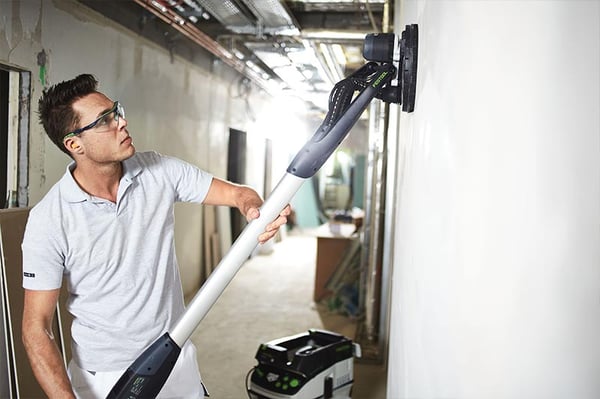
Granat Net (80-400 Grit) For applications that produce high volumes of dust
Drywall sanding can be a labor-intensive, time-consuming task. Using Granat Net with the Planex Drywall Sander, however, makes the process feel as smooth as the final product.
The name gives insight into what makes Granat Net such a great option for high dust situations. It features an open net structure that provides full-surface breathability, allowing for edge-to-edge dust extraction to occur during use. It is recommended to use a protection pad between the Granat Net and your standard backing pad so the backing pads will not wear faster than normal due to the open net abrasive.
The surface of Granat Net minimizes the risk of scratches or inconsistencies, meaning you get the perfect finish the first time, every time.
Platin 2 (400-4000 Grit) For use on semi-gloss and high-gloss finishes
Platin 2 is ideal for projects that require fine finishes and was specifically created for high-gloss finishes on closed surfaces. As any painter will tell you, minimizing dust is a crucial aspect of achieving a clean, smooth finish.
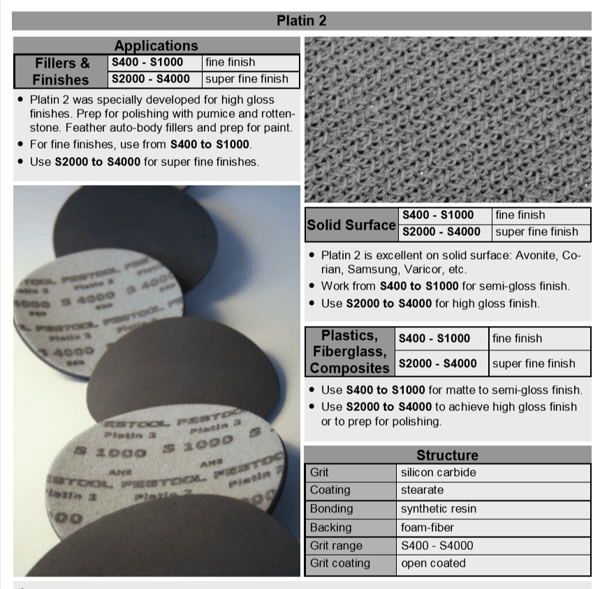
Painting Grits
Since coarser (lower grit) sandpapers remove old finishes quickly, it can be tempting to use them to make the tedious job of wall sanding go by faster. While they can help with the initial removal of built-up paint, coarse abrasives can actually add time and frustration to your job, as they are more likely to leave gouges or scratches on the surface rather than making it smooth and ready for paint.
For this reason, painters generally use medium grit—around 120 to 150—to prepare walls for painting. When it comes to finishing off the job, a gentle and fine 220 grit is usually the best way to go.
-
Heavy Duty Sanding
-
Granat: 40 to 60 Grit
-
Saphir: 36 to 50 Grit
-
Coarse Sanding
-
Granat: 80 to 120 Grit
-
Granat Net: 80 to 120 Grit
-
Saphir: 80 to 120 Grit
-
Intermediate Sanding
-
Granat: 150 to 180 Grit
-
Granat Net: 150 to 180 Grit
-
Vlies: 100 to 280 Grit
-
Fine Finish
-
Granat: 220 to 1000 Grit
-
Granat Net: 220 to 400 Grit
-
Platin 2: 400 to 1000 Grit
-
Super Fine Finish
-
Granat: 1200 to 1500 Grit
-
Platin 2: 2000 to 4000 Grit
Metalworking
Working with metal is inherently different than working with wood, drywall, or any other surface. In order to achieve your desired results, the abrasives must be closed-coated, meaning that the entire surface of the sandpaper is covered with abrasives. This is in contrast to open-coated sandpaper, which has more room between the abrasive granules, allowing debris to build up in between the granules and clog your sander.
Granat (40-1,500 Grit) Ultra versatile, longest lasting abrasive
In yet another testament to its durability and versatility, Granat continues to be a top choice even when working with this difficult material. The incredible durability of Granat abrasives means that they can be used to strip paint or varnishes, remove rust, and generally help you smooth out imperfections in a variety of metals.
Granat is versatile enough to be used on both hard metals like titanium or stainless steel as well as softer metals such as brass or aluminum.
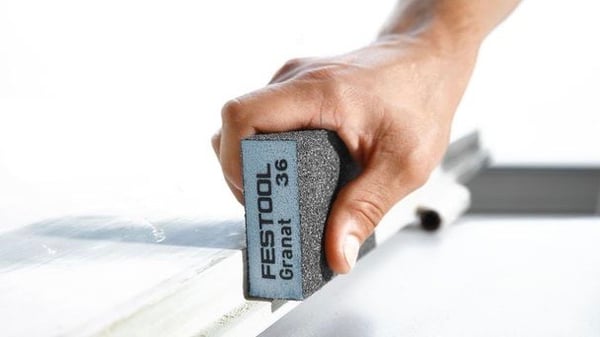
Saphir (24-100 Grit) For extreme sanding on hard metal surfaces
Saphir is a heavy-duty aluminum oxide abrasive that was made for tough surfaces. It can handle extreme and repeated use on even the hardest metal surfaces like stainless steel, all without wearing or tearing. This highly durable option is even strong enough to use on concrete!
Saphir abrasives are beyond closed-coated. Tools for Working Wood summarized Saphir’s benefits, stating:
“Saphir is for heavy duty, coarse sanding of wood, plastics, fiberglass, composites, paint, and stucco, and for such rugged tasks as removing corrosion from weathered steel and hull work on boats. Use it on hard materials and in difficult areas - heavily worn stairs would be a good example - where standard abrasives just don’t hold up. It offers exceptional services life because of its high tear-resistant fabric backing and heat-resistant bonding coat.”
Vlies (80-800 Grit) For finesse sanding metal surfaces
Vlies, on the other hand, are great for more finesse sanding needs and are particularly adept at maneuvering over contoured surfaces. They can also be used for cleaning and scuff sanding metal surfaces.
Vlies abrasives work well for light sanding applications and result in a matte or semi-gloss finish. Though available in a variety of lengths and shapes, many metalworkers find the convex-shaped pads to be particularly helpful for reaching inside corners and tight spots.
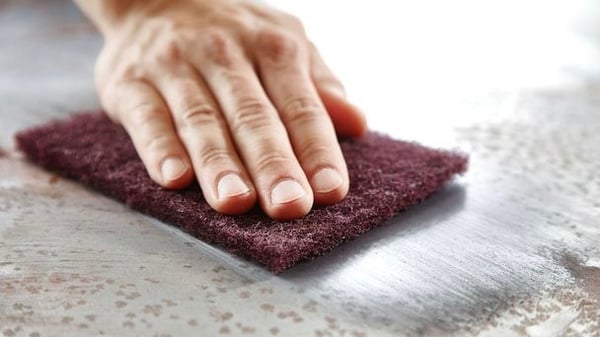
Metalworking Grits
As would be expected, metalworking is one area that lower grit abrasives come in handy. For grinding and notching, grits as low as 20 to 40 will get the job done. Depending on the type of metal and desired finish, polishing and finishing grits can vary from 120 all the way up to 320 grit. When you get up to around 300 grit, however, it’s often recommended to switch off the power tool and use some good, old-fashioned elbow grease.
-
Heavy Duty Sanding
-
Granat: 40 to 60 Grit
-
Saphir: 24 to 50 Grit
-
Coarse Sanding
-
Granat: 80 to 120 Grit
-
Saphir: 80 to 100 Grit
-
Vlies: 80 to 100 Grit
-
Intermediate Sanding
-
Granat: 150 to 180 Grit
-
Fine Finish
-
Granat: 220 to 1000 Grit
-
Vlies: 280 to 320 Grit
-
Super Fine Finish
-
Granat: 1200 to 1500 Grit
-
Vlies: 800 Grit
Conclusion: So, Which Should I Use?
Whether it’s about abrasive types, grits, or anything else, our trained experts are standing by to help answer your questions. Contact us online or give us a call at 877-777-4717.
Festool Abrasives Index
Granat |
Granat Net |
Platin 2 |
Rubin 2 |
Saphir |
Vlies |
|
Festool DTS 400 |
||||||
Festool ETS 125 |
||||||
Festool ETS 150 |
||||||
Festool LEX 2 150 |
||||||
Festool LEX 2 185/7 |
||||||
Festool LS 130 |
||||||
Festool Planex |
||||||
Festool RAS 115.04 |
||||||
Festool RO 90 |
||||||
Festool RO 125 |
||||||
Festool RO 150 |
||||||
Festool RS 2 |
||||||
Festool RTS 400 |
||||||
Festool Shop Rolls |

